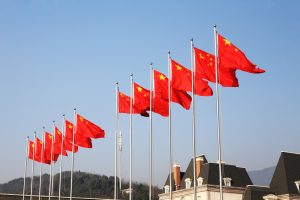China’s Foreign Ministry announced today that the third Belt and Road Forum for International Cooperation will be held from October 17 to 18 in Beijing. That nails down the timing for the forum, which had been described for months only as happening sometime “in October.”
The Belt and Road Forum has been on the agenda since March 2023, when then-Chinese Foreign Minister Qin Gang confirmed during the National People’s Congress that it would be one of the “two major diplomatic events that we will host” (the other being the China-Central Asia leaders’ summit, which took place in May). Even before that, speculation was rife that China would be holding a third iteration this year, to mark the 10th anniversary of Chinese leader Xi Jinping’s first mentions of the concepts that would become the Belt and Road Initiative (BRI): the Silk Road Economic Belt and the 21st Century Maritime Silk Road.
The first Belt and Road Forum was held in May 2017; two years later, in April 2019, China hosted a second edition. But before the BRF had a chance to really become institutionalized, the COVID-19 pandemic intervened. For much of the period from 2020-2022, China didn’t host many foreign visitors as it followed a strict zero COVID policy. Instead of organizing a global in-person forum, Beijing held a much quieter virtual meeting on the Belt and Road, limited to Asia-Pacific countries, in June 2021.
Now, having reopened to the world and resumed full-scale diplomatic exchanges, China is ready to host the third BRF. The big question remaining is who will come. According to a Foreign Ministry spokesperson, “representatives from more than 130 countries as well as many international organizations” have RSVP’d. But as of yet, there’s no clarity on the level of representation – particularly, which top leaders will attend.
In 2017, 30 heads of state or government (including China’s own Xi Jinping) attended the BRF. That number grew to 37 in 2019 (again including Xi). Beijing will undoubtedly want to top that number this year, so it can claim continued momentum and growth for the BRI, especially given the 10th anniversary tie-in this year.
But that may prove difficult. China’s global reputation in general – and that of the BRI in particular – has soured noticeably since the last BRF in 2019.
Nowhere is that more true than in Europe, which represented a large bloc of the participating countries in the last two BRFs. A full one-third of heads of state or government who attended the 2017 BRF were from European countries; that figure dropped just slightly, to around 30 percent, for the 2019 edition. Yet China’s relations with many European countries have declined considerably over the past four years, especially as Beijing continues to parrot Russian talking points regarding the ongoing war in Ukraine. Elections have also ushered in more China-skeptical governments in countries like Czechia and Italy, the latter of which has made no secret of its plans to withdraw from the BRI.
Some key countries to watch in that regard are Belarus, Czechia, Greece, Hungary, Italy, Russia, Serbia, and Switzerland. All eight sent top leaders to the BRF in both 2017 and 2019; which ones do so again will be telling.
On that note, Russian President Vladimir Putin was one of the earliest confirmed attendees, even before the summit’s timing had been settled. That eager announcement was likely a result of Moscow’s need to demonstrate international support amid the pressure stemming from its ongoing invasion of Ukraine. Yet by making Putin’s presence an early headline of the event, China may have discouraged other European partners from wanting to show up.
Incidentally, EU High Representative for Foreign Affairs Josep Borrell will be in China this week, from October 12 to 14 – close enough in timing that he can discuss the BRF without actually attending it.
Further complicating matters for China is another timing issue: A number of Asian leaders just visited China during a wave of diplomacy centered on the hosting of the Asian Games in Hangzhou. Kuwaiti Crown Prince Mishal Al-Ahmad Al-Jaber Al-Sabah, Nepali Prime Minister Pushpa Kamal Dahal, South Korean Prime Minister Han Duck-soo, Syrian President Bashar al-Assad, and Timor-Leste’s Prime Minister Xanana Gusmao were among the foreign leaders to visit China for the opening of the Asian Games on September 23.
It may simply be too soon for these leaders to turn around and make yet another trek to China less than a month later – although arguably there is a statement being made by opting for the Asian Games over the BRF. A sporting event, after all, is less politically controversial than the Belt and Road.
If China is to top its 2019 headcount for global leaders, it will have to expand the BRF’s guestlist into new areas. That might not be too tall an ask. Nearly every African country has signed on to the BRI, yet there was a curious lack of African leaders in attendance at the 2017 and 2019 BRFs. Only two top African leaders came in 2017 (from Ethiopia and Kenya) and five attended in 2019 (from Djibouti, Egypt, Ethiopia, Kenya, and Mozambique).
Similarly, just one Middle Eastern country (the UAE) sent a top leader to the BRF in 2019; none came in 2017. Given China’s growing presence and diplomatic outreach to the Gulf, we may see more attendees from the region at the third BRF – if the escalating war between Israel and Gaza doesn’t keep Middle Eastern heads of state at home.
Nevertheless, we do have a guest list starting to take shape. Among the heads of state expected to attend are Cambodian Prime Minister Hun Manet, Chilean President Gabriel Boric, Hungarian Prime Minister Viktor Orban, Indonesian President Joko Widodo, Kazakh President Kassym-Jomart Tokayev, Lao Prime Minister Sonexay Siphandone, Pakistani Prime Minister Anwar-ul-Haq Kakar, Russian President Vladimir Putin, Serbian President Aleksander Vucic, and Uzbek President Shavkat Mirziyoyev. We can expect more announcements in the week leading up to the BRF.

































